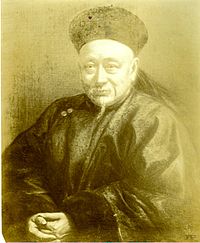Guo Songtao
Guo Songtao | |
|---|---|
郭嵩燾 | |
Chinese Ambassador to France | |
| In office 22 February 1878 – 25 August 1878 | |
| Monarch | Guangxu |
| Preceded by | Position established |
| Succeeded by | Zeng Jize |
| Personal details | |
| Born | 11 April 1818 Xiangyin, Hunan, Qing dynasty |
| Died | 18 July 1891 (aged 73) Changsha, Hunan, Qing dynasty |
| Nationality | Chinese |
| Alma mater | Yuelu Academy |
| Occupation | Diplomat |
Guo Songtao (
Early career
Guo was born in
He called for foreign languages to be taught at a government school in 1859.[1]
Diplomatic service
Guo became an important member of China's

That same year, he authored his Shixi jicheng (使西紀程 Record of an envoy to the West), in which he expressed admiration for Western political institutions, writing that 'The kingdoms of Europe date back for some 2,000 years. Their governmental and educational systems are well-ordered, enlightened, and methodical'.[4]
Advocacy of Railways
In July 1877 while serving as Chinese Minister to Britain, Guo led an entourage of legation officials on a visit to the Ipswich engineering works of Ransomes and Rapier to see the manufacture of steam locomotives, railway equipment and other engineering products. He travelled from London to Ipswich by train and expressed his deep admiration for Britain's railway system, commenting that the distance travelled during the two-hour train journey would have taken two or three days in his own country.
He subsequently became a great proponent of railways and other modern engineering development in China, incurring the wrath of conservative and anti-railway Court officials, who resented his representations. In early 1878 he was also appointed Minister to France (concurrent with his British appointment) and moved to Paris, but in late 1878 he was ordered to return to China. His Shixi Jicheng was ordered burned by an imperial edict under pressure from the conservative Qingyi Movement.[5] Upon his return, fearful for his life and under intimidation because of his pro-foreign views, he returned to his home province and virtually retired from public life, spending his time writing and teaching in an academy.
See also
Works
Notes
- ISBN 978-0-521-22029-3.
- Sala's JournalMarch 4th 1893
- Daily TelegraphMay 28th 1878
- ISBN 978-0-415-44688-4.
- ISBN 978-0-415-44688-4.
References
- Hummel, Arthur W. Sr., ed. (1943). . Eminent Chinese of the Ch'ing Period. United States Government Printing Office.
- Kuo, Sung-t'ao, Hsi-hung Liu, and Te-i Chang. *The First Chinese Embassy to the West; the Journals of Kuo-Sung-T'ao, Liu Hsi-Hung and Chang Te-Yi. Translated by J. D. Frodsham. Oxford: Clarendon Press, 1974.
- Visit of the Chinese Ambassadors to Ipswich”, report in the “Ipswich Journal” July 3, 1877 ( Hong Kong Railway Society – P.A. Crush Chinese Railway Collection)
- Day, Jenny Huangfu (2018). "The Scholar." Qing Travelers to the Far West: Diplomacy and the Information Order in Late Imperial China. Cambridge: Cambridge University Press.
